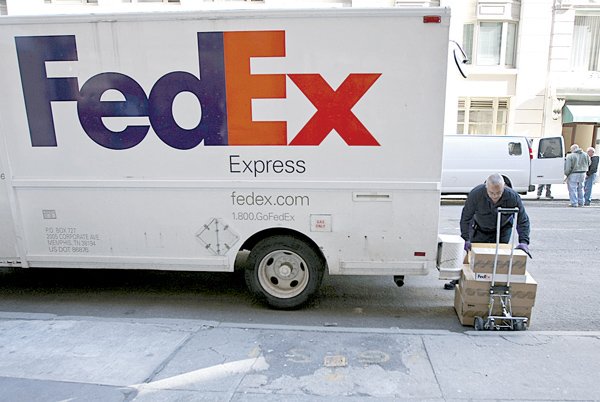WASHINGTON — For more than a year, FedEx and its shipping rival, United Parcel Service, have been engaged in one of the fiercest lobbying battles in recent memory, with millions of dollars spent on advertising, websites, grass-roots organizing and other tactics more commonly seen in political campaigns.
The reason for all the excitement? An obscure, 230-word provision that would require FedEx Express to comply with the same labor laws as UPS, making it easier for the International Brotherhood of Teamsters and other unions to organize.
The no-holds-barred battle has become the main sticking point in spending legislation for the Federal Aviation Administration, which is limping along on short-term funding while House and Senate negotiators wrangle over the proposal. The latest 30-day extension was approved by both houses before the Fourth of July recess.
The dispute also underscores the increasingly sophisticated, campaign-style tactics used by corporations and unions to press their positions in Washington, from drink makers condemning proposed soda taxes to the sweeping public-relations battles that swirled around the health-care debate. But unlike those cases - where the policies in question would have broad effects on consumers - the FedEx-UPS fight centers on a policy that would directly affect only one company.
“It is unusual to see a fullblown, integrated campaign of this type over such a specific and narrow policy issue,”said Douglas G. Pinkham, president of the Public Affairs Council, a nonpartisan communications strategies group that counts FedEx and UPS as members. “But I think it’s a sign of things to come. You’re going to see a lot more companies, associations and activist groups running public-relations campaigns that look a lot more like political campaigns.”
The crux of the battle comes down to a quirk in the history of labor law: UPS drivers are governed by the National Labor Relations Act, while FedEx Express drivers are covered by the Railway Labor Act. The former law is seen as more friendly to unions by allowing local organizing and the ability to strike; the latter, which was first applied to FedEx because it was founded as an airline, generally bans strikes and requires labor unions to organize an entire company at one time.
Now, under a provision sponsored by Rep. James Oberstar, D-Minn., and approved by the House, many employees at FedEx’s express-carrier operation would be covered by the same labor law as UPS drivers.
FedEx and its voluble antiunion chairman, Fred Smith, have spent the past year attacking the proposal as a “brown bailout” for UPS and the Teamsters. FedEx, based in Memphis, has more than doubled its lobbying budget during the campaign, to about $1.5 million a month, disclosure records show.
The company has also taken to the road, organizing town-hall meetings; tours of FedEx facilities for prominent officials; publicity running on Facebook and other social media; and even a campaign style public debate between two company spokesmen.
“Day to day, we’ve run this much like the media team in a political campaign,” said Maury Lane, FedEx’s communications director. “The more we talked about our candidate, which was FedEx, the more people were willing to listen.”
FedEx argues that the provision would open up the company to disruptive slowdowns and strikes, citing a bitter 1997 walkout at UPS. Smith, a longtime Republican fundraiser and former fraternity brother of former President George W. Bush, threatened to cancel an order for 15 Boeing jets if the provision passes.
“We vigorously oppose this,” Smith said during a meeting last month with The Washington Post editorial board. “It completely changes our business model. ... If this isn’t a bailout of a large company, I don’t know what is.”
UPS and the Teamsters who drive its familiar brown and gold delivery trucks have pushed back with lobbying efforts of their own, though they say they have spent less and have been less aggressive.The firm’s lobbying expenditures surged 60 percent last year, to more than $8 million, and UPS and the union have helped organize petitions, phone calls and letters to Congress. (FedEx alleges that many of those letters were written under duress; UPS denies that.)
UPS and the Teamsters say FedEx is getting preferential treatment with a setup that effectively prevents about 50,000 Express drivers from unionizing. They say those employees should be treated like other truck drivers, including those who work for FedEx’s separate ground-only operation.
Ken Hall, director of the package division at the Teamsters, also complains that FedEx has engaged in “scorched-earth” tactics in its attempt to kill Oberstar’s provision. “This is an exception that benefits only one company in this entire country,” he said. “The role of the federal government should not be to provide an advantage for one company over another.”
For the moment, the two sides appear to be in a standoff. The GOP senators representing FedEx’s home state of Tennessee, Lamar Alexander and Bob Corker, have threatened to filibuster any bill that includes the pro-UPS provision. Oberstar and other union supporters also remain unbowed, leaving the fate of the provision up in the air.
“I think both parties, UPS and FedEx, have been steadfast in our chosen approaches in educating people about this issue,” UPS spokesman Malcolm Berkley said. “The audience is the 535 people and their staffs who are going to be making the decision and weighing the evidence.”
Business, Pages 67 on 07/11/2010

